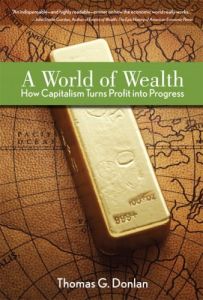Join getAbstract to access the summary!

Join getAbstract to access the summary!
Thomas G. Donlan
A World of Wealth
How Capitalism Turns Profits into Progress
FT Press, 2008
What's inside?
Capitalism and free markets can solve problems you never thought were economic. Read on to learn how.
Recommendation
Journalist Thomas G. Donlan is one of the U.S.’s strongest advocates of capitalism. The editorial page editor of Barron’s, he is a convinced, and often convincing, champion of free trade, free markets, deregulation and investment. These ideas went into something of an eclipse in the U.S. following the disastrous events in the real estate and asset-backed securities markets. However, getAbstract finds that Donlan’s book presents a spirited explanation of why these events were essential to putting the world back on course for economic growth and rising global prosperity. His style is concise, clear, pointed and frequently witty. True believers in the church of capitalism will value his defense of their doctrine; skeptics will likely respect his well-argued points, though they may conclude that he can be as much an apologist for capitalism as a proponent of it.
Summary
About the Author
Thomas G. Donlan, editorial page editor of Barron’s, writes on the economy, politics and investing. He is a frequent media source and guest.

















Comment on this summary